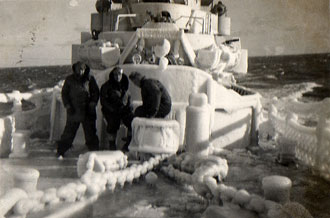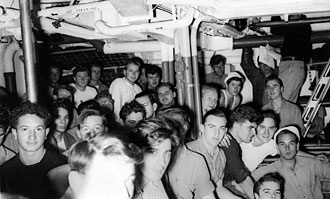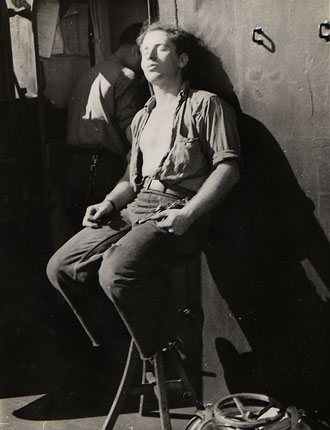




Advanced Search
Dress Up | 1st Person | African American Map | Now Read This | Magic Lens | Tool Videos | Architecture | e-Postcards | Chronologies
Paul Slater - 1942-life: Life on Board the Walter S. BrownFor the crew of a World War II destroyer escort stationed in the north Atlantic Ocean, life on board ship could be cold, cramped, and isolated... Learn more about Paul Slater: View a timeline of his life and listen to his full interview. Stories by this speaker

A snow encrusted USS Walter S. Brown sails the north Atlantic Ocean. "At a reunion," according to Paul, "a shipmate asked how I coped with the heat of the engine room. I retorted, "How did you cope with the post on gun in all sorts of weather, especially the cold?' 'What cold,' he asked, having forgotten the north Atlantic winters. It took this and another picture to convince him!" Because they were stationed on ships far away from support, World War II sailors were particularly vulnerable to the weather resulting from the changing seasons. During an oral history interview, David M. Graybeal, who served on board the Destroyer Escort USS Snowden, remembered the instability brought on by the north Atlantic: ...those destroyer escorts in the north Atlantic were heavy sea rollers like everything and so we were always dealing with some sea sickness and about equally bad was getting bruised. Sometimes we rolled more than 45 degrees from vertical, which would mean that the bulkhead was more level than the deck and we had a passage way. I've seen men's feet patterns on the balk head where they would put their foot up there to keep from falling over. You'd be walking along and …all of a sudden the ship would throw you into one of those iron stations or something. I was always bruised in some way or another by being thrown around and sometimes it would scare you to death too. You'd think "boy this things going to roll all the way over and it would come back but after a while after a year or two I got to the place where I thought it's not going to roll over so I just got a kick out of when it would keel over like that.1 Despite the hazards of sea, Paul believes that, "basically, compared to friends of mine who served as combat infantry, man, I had a walk in the park. But we...survived a really bad storm, for Pete's sake. The Atlantic Hurricane of 1944.” Five vessels and 344 lives were lost in the storm. Photograph courtesy of Paul Slater. 1David M. Graybeal Interview, Conducted November 18, 2002 For the Naval History Foundation in collection Destroyer Escort Sailors Association Oral History Project at Monmouth University. Guggenheim Memorial Library, Archives and Special Collections. http://asp6new.alexanderstreet.com/firp/firp.result.documents.aspx?collectioncode=OHC0002907& sortorder=Narrator. Retrieved November 20, 2009. 
In addition to accepting the contingencies of the weather, space was at a premium on a destroyer escort. The sailors on board needed to share small amounts of space. Paul offers this picture as evidence of "the congested nature of crews' quarters with all sorts of pipes, cables and ducts passing through." Martin Davis also served on a destroyer escort during the war. Like Paul Slater, Martin remembers vividly just how tight these spaces were: A typical day was such that you were crowded with 218 people aboard a ship that was fourteen hundred tons, three hundred and six feet long, and thirty-six feet wide. And you were crowded, the bunks were three high with three lockers underneath, and the ship was rolling, jumping all over the place.... when I first got aboard the ship they didn't have bunks for all of us, and so the three of us that came out of Boot Camp slept on hammocks, so I slept in a hammock for at least a month and a half until I got my own place. It was horrible because I was bouncing up against the overhead, I had to carry a pillow on my face, and I was short,...so I couldn't even put my own hammock up, I had to have this big Texan, about six feet six, put me there. It got to the point whereby I walked around with what looked like a dance card, and I asked the fellows, when are they going on duty. And I'd sign their names up because I'd use their bunks while they were on duty and they'd come back after four hours, and I'd move over to someone else. So I did that until I finally ended up with my location. Life aboard the ship was such that you were meeting people now not only from all over the country, but you were seeing them in a very, very different way...2 Photograph Courtesy of Paul Slater. 2Martin Davis Interview, Conducted November 14, 2002 For the Naval History Foundation in collection Destroyer Escort Sailors Association Oral History Project at Monmouth University. Guggenheim Memorial Library, Archives and Special Collections. http://asp6new.alexanderstreet.com/firp/firp.result.documents.aspx?collectioncode=OHC0002907&sortorder=Narrator. Retrieved November 20, 2009. 
"I was catching a few Zs outside the machine shop when someone took this picture," according to Paul. When asked what kind of information sailors received about the progress of the war, Paul responded that "while we were at sea, you didn't get too much." The one piece of information that apparently did reach everyone right away on board a Destroyer Escort was the news that President Roosevelt had died. David Graybeal who was on board the USS Snowden recalls, "when the word came we were at sea, actually we were on our way to Hawaii and the word came that he had died and it was like a member of my family had died. Like my father had died and we just thought 'what's going to happen now?' Then the word came that some guy named Truman was going to run the country. I said 'What does he know?' (Laughs) Everybody was down on Truman.”3 John Lampe who was a Radio Man Third Class remembers, "When he died I was in Halifax, Nova Scotia. We had gone to a restaurant in Halifax and when he died there was an announcement over the speaker. It affected us a little bit, but we were young. It affected the Canadians, the older Canadians. They were the ones who kept staring at us; they were the ones who were tearing up. Roosevelt was the only president I knew. Roosevelt took office in 1932 and I was born in 1926. I was six when he took office and I remember my father was a big Roosevelt man because Roosevelt was king around our house. He ran in 1936 and then he ran in 1940, and then he died April 13, 1945.”4 Third Class Petty Officer Alfred Marker remembers, "It was a very solemn time for everybody aboard ship because the leader who was our president had died. We knew nothing about Mr. Truman. But when he died, you'd swear you lost a member of your family. Nobody talked; they just went about doing what they had to do. It was a very sad time because it was something we didn't expect."5 3David M. Graybeal Interview, Conducted November 18, 2002 For the Naval History Foundation in collection Destroyer Escort Sailors Association Oral History Project at Monmouth University. Guggenheim Memorial Library, Archives and Special Collections. Retrieved November 20, 2009. 4John Lampe Interview, Conducted November 16, 2002 For the Naval History Foundation in collection Destroyer Escort Sailors Association Oral History Project at Monmouth University. Guggenheim Memorial Library, Archives and Special Collections.http://asp6new.alexanderstreet.com/firp/firp.result.documents.aspx?collectioncode=OHC0002907&sortorder=Narrator. Retrieved November 20, 2009. 5Alfred Marker Interview, Conducted December 2, 2002 For the Naval History Foundation in collection Destroyer Escort Sailors Association Oral History Project at Monmouth University. Guggenheim Memorial Library, Archives and Special Collections. http://asp6new.alexanderstreet.com/firp/firp.result.documents.aspx?collectioncode=OHC0002907&sortorder=Narrator. Retrieved November 20, 2009. Photograph Courtesy of Paul Slater. Story Clip #1:"I was never frightened that I was gonna die" Wait for each file to download, then click the arrow to play the audio. I, I was never frightened that I was gonna die, because I somehow, you know...maybe it was my age...I, I just sorta knew that I was gonna come out of that war okay. And uh, there were times when I was very concerned, you know, that something might mess up. You know, when you're, when you're down there and they call for flank speed, and you're the guy that's responsible for those two engines, you know, you want to hear them really roar smooth and trouble-free, and so on and so forth. And you can, you can be concerned, and...but...no, I, I felt that I was immortal. And you know, people ask me, was I brave? I wasn't brave either, 'cause you have to be afraid to be brave. I wasn't afraid. [chuckle] I was, I was immortal. Q: You were there doing your job, and you were busy at it. Yeah, that's right. And I was good. I knew what I was doing. So. Q: Did you ever have-are there experiences on that destroyer that stand out? Well, yeah, you know, uh?We had, you know, we had a couple of close calls. I mean, basically, compared to friends of mine who served as combat infantry, man, I had a walk in the park. But we survived a really bad storm, for Pete's sake. The great Atlantic Hurricane of 1944. I Googled it and, by God! They have it there. It was very impressive, and four ships went down, including a destroyer. And you know, I don't know...Maybe we had another ...Oh, well yeah, we had ...we were hit once by [a] dud torpedo. I guess that's lucky or whatever. And that's it. Oh, we almost had a, [laughs] we almost collided with a British cruiser, and that was really just, just luck. I mean we both had radar, but it was a terrible storm, and if not for lookouts like live people, I would not be here. So we had three close calls. But we once went...three good...we had like, maybe four, but not much, it was mostly routine duty, just you know, serving your time. Practicing, lots of practicing, lots of preventive maintenance on the equipment and so on. Story Clip #2:"They didn't have to love me but I didn't want to hear anything:" Paul confronts the anti-Semitism of his fellow sailors First of all, I came from a totally secular family. I mean, there was never any, any religious dimension to anything we did. We knew we were Jews; we were educated in Yiddish and Jewish history, learned some Yiddish, and so on. But uh, that was the extent of it. But, you know, if you went through our neighborhood, no matter where you were, you...somebody didn't like you, you know. It...was always that way, I mean even with the other, the other groups. Some, some, some places they didn't like people 'cause they were uh..or like where I hung out a lot, a lot of people, a lot uh...boy, they despise the Irish for some reason, which absolutely escaped me. My first love was Nora Keegan, so how could that...? [chuckle] I was twelve and she was fourteen, but whatever. Anyhow, in the Navy, right early on, I just didn't accept any garbage about it. And in those days I had a, I guess, a pretty terrible temper, and I was called into the adjutant who said, Look, I understand what's happening here, but you're gonna have to... he didn't say "Cool it", but that was the gist of it, because it's gonna into your record and you really don't want that to follow you through your career in the Navy. What career? I signed up for the duration of six months. Not a career. And, you know, once I made it clear that they didn't have to love me but I didn't want to hear anything; it took some making a clear effort, but it worked. And then I realized how it had to be handled, and when I went to a diesel school after boot camp, right away I made it very clear where I was coming from, who I was, and...But to some extent, being from Brooklyn was even much worse than being a Jew, for Pete's sake. You're from Brooklyn? Yeah, I mean, isn't everybody from Brooklyn? You know, and if you have a temper, you tell'em, you know, there's more people in my neighborhood than your whole state, so lighten up! And uh, that's about as polite as I ever got. And then when I was assigned to the ship, she wasn't completed yet, so we were put in a barracks up there in the Charlestown Navy Yard. Right away I made it clear what, what, what the situation was and if they didn't like it that was too bad, but I didn't want to hear anything about it. And it, it worked pretty well. And there were several Jewish kids on the ship, as a matter of fact. And one of my friends who became a close friend on the ship, years later, we were walking around at a reunion. He says to me, tell me Slats, did you used to be Jewish? I said, yeah, and I still am, Bud. And then he sent me, where he got these numbers, the percentages of Jews who served in the ser...in the military during the war, and I think it was two percent of the population, so...half of them were women, I have to assume. But more than two percent were serving. The Navy was more than two percent. The Air Force was much more than two percent. The Army was more than two percent. The Marines were two percent. Heh! Which made sense. Q: Why do you say it made sense? Well, uh?well, I'll tell?Well, I'll give you another anecdote if?You know who Tony Curtis is? Q: Yes. Okay, he's a Jew, okay? From the Bronx. And uh, he was seventeen when the war broke out, and he was gonna sign up when he persuaded his mother to sign, and he describes, at one of our reunions, how he went to sign up, and they had these big recruiting outfits in-at that time. And the first one is a Marine, and the Marine guy calls him over, you know, how 'bout...you wanna sign up? And Tony says...tells me, he says, I wasn't gonna join the Marines. The Marines is too dangerous, he says to me. And he spoke with a Bronx accent, which I thought was amazing, 'cause in the movies he didn't. Anyhow, he s' too dangerous, he says, so I went and I joined the Navy, he said. Which is true, but he volunteered for submarine duty, alright? [NM chuckles] So that's how people make decisions. And I, I'd like to know how he experienced being a Jew in the Navy, also. But, it was quite clear after a while that everybody had to do their job. To most people. I mean there was some people that were totally uneducable or whatever, there's not - you know, we have'em today, so... you know, I see them at the viewing of nominations to the Supreme Court. Story Clip #3:"Did you know what was happening in the big picture of the war?" Q: As a sailor, did you know what was happening in the big picture of the war? Did-when you were on your destroyer escort, did you know what was happening in the sort of the larger scheme of things, and ... say in Germany or in the camps, things like that. Did you know about that? And... Well we...I'm sorry. Q: What was that like? If you... Well we...I had heard about that, before I went into the Navy. And uh, there were ...refugees that showed up in Brooklyn who had gotten out of Germany way ahead of time. And ...they had heard about this. I mean everybody?anybody who was a...was a Jew had heard about Hitler by then. But they had heard about camps and so on. I don't know if they knew about you know, crematoria, but they knew there were concentration camps. And uh, as far as... being aware of or not of the big picture while we were at sea...You'd get some news. In fact, Hitler made a speech which somebody picked up and printed out for me on the ship. I don't think I included that. Uh, you know, so we had heard that kind of stuff. We heard about Stalingrad, but most of it actually... to really answer your question, we didn't hear about it until we got someplace, either back to the States for repairs or to pick up a convoy. While we were at sea, you didn't get too much. Obviously, when Roosevelt died, we were told. I think there's a picture there, the flag at half staff; we were at sea at the time. But we were not all that well-informed until we got back home, or even if we got to some decent port in the Mediterranean. It's a good question. We really were not that well-informed, now that I think about it. Next reunion I'm gonna ask the guys what they think. Related ResourcesThe following source file was not found: ebdav/centuries/html/resource/slater1942_life.html
|
| |
Home | Online
Collection | Things To Do | Turns
Exhibit | Classroom | Chronologies | My
Collection
About This Site | Site
Index | Site Search | Feedback